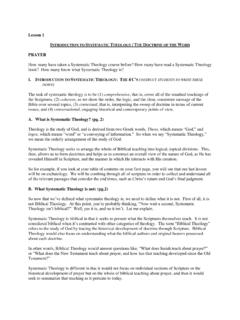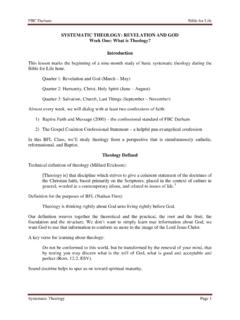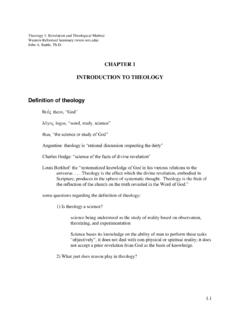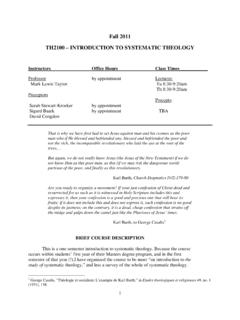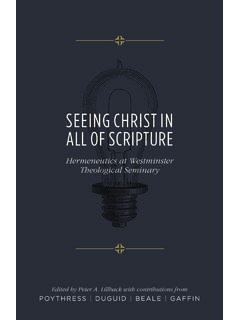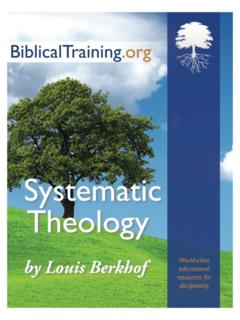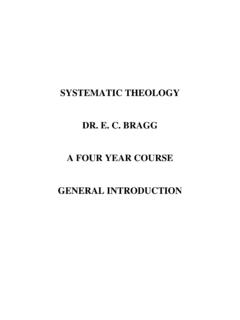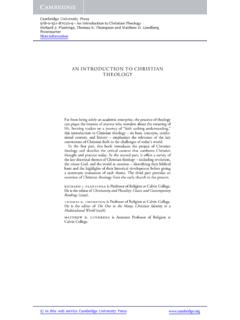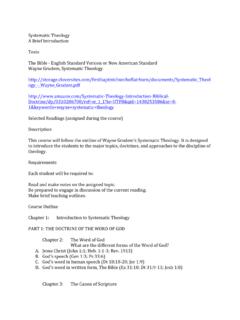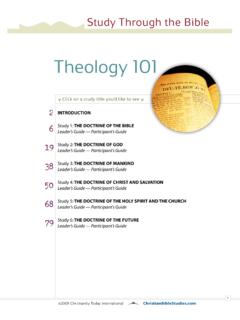Transcription of Introducing Systematic Theology - Biblical Training
1 Introducing Systematic Theology Dr. Bruce Table of Contents Study 1: The Nature of Systematic Theology & the Doctrine of Revelation 3 Study 2: The Doctrine of God, part 1: The Attributes of God 9 Study 3: The Doctrine of God, part 2: The Trinity 13 Study 4: The Doctrines of Humanity & Sin 17 Study 5: The Doctrine of the Person of Christ 23 Study 6: The Doctrine of the Work of Christ 28 Study 7: The Doctrine of the Holy Spirit 32 Study 8: The Doctrine of Salvation 36 Study 9: The Doctrine of the Church 41 Study 10: The Doctrine of Last Things 44 Biblical Training and Western Seminary Page 2 Understanding Systematic Theology Biblical Training and Western Seminary Page 3 I. What Is Evangelical Systematic Theology ?
2 A. Definition of Evangelical Systematic Theology "Evangelical Systematic Theology is the comprehensive study and coherent organization of what can be known primarily from Scripture, which is Theology 's only final and ultimately authoritative source, and secondarily from any and all other relevant sources, about God and his relation to the created universe in a matter that is understandable and applicable to contemporary audiences, to the end that God's people are strengthened and satisfied in him to the praise and glory of his name." B. Five Areas of Elaboration 1. The Subject Matter of Evangelical Theology : 2. The Sources of Evangelical Systematic Theology 3. The Structure of Evangelical Systematic Theology 4. The Setting of Evangelical Systematic Theology 5.
3 The Satisfaction of Evangelical Systematic Theology Study 1: The Nature of Systematic Theology & the Doctrine of Revelation "God is most glorified in us as we are most satisfied in him." John Piper II. Why study Evangelical Systematic Theology ? Biblical Training and Western Seminary Page 4 A. It provides a comprehensive scriptural vantage point B. It provides an interpretive guide for reading the Bible. C. It provides a way of understanding what we believe and why we believe it in the midst of religious pluralism.
4 1. There is little sympathy toward Christian faith today 2. Pressure to compromise on key doctrines. D. It shapes the whole person: Head, heart, hands, and habitat 1. What does Systematic Theology have to do with your own relationship with God? Do you think that understanding Theology helps people have a better relationship with God? Why or why not? 2. Read Psalm 34:8. What does this verse have to do with studying Systematic Theology ? How can it help you appreciate what Theology is all about? 3. What does Systematic Theology have to do with what we actually do in church? 4. What are some questions you have about Theology that you would like to learn more about as a result of this study? Why are those questions important to you? 5.
5 What are your basic goals for this study? What do you need to do to make sure that you accomplish those goals during this study? FOR FURTHER REFLECTION III. The Doctrine of Revelation Biblical Training and Western Seminary Page 5 A. The Concept of Revelation 1. Defining Revelation "He pulls away the cloth and you see the painting that was there before, but hidden. It was covered, but now it is laid bare. It is disclosed for what it is. That is revelation. God laying Himself bare before us." 2. Two key passages a. Psalm 19 b. Matthew 11:25-27 B. Two Main Forms of Revelation 1. General Revelation a. Definition of "general" b. The Main Avenues of General Revelation i. Creation (Rom 1:18-20) ii. Conscience (Rom 2:14) c.
6 The Effect of General Revelation Biblical Training and Western Seminary Page 6 2. Special Revelation a. Definition of "special" "We learn specific things about God and His purposes and His work; specific things about His will and ways; specific purposes, specific goals, specific actions of God through special revelation that we could not know just by looking at the created order or by examining our consciences." b. The Main Avenues of Special Revelation i. Personal encounter (Exod. 3) ii. Mighty act (Exod 14:21-25) iii. Propositional revelation (1 Tim 3:16) iv. The Incarnation (John 1:14; Heb 1:1-3) c. The Efficacy of Special Revelation IV. The Inspiration of Scripture Biblical Training and Western Seminary Page 7 A.
7 Definition of Inspiration: 1. Definition "the out-breathing of God's breath that results in the writing of the Scriptures as they were originally given by the apostles and prophets." 2. Verbal, Plenary Inspiration B. Key Passages and Their Teachings 1. 2 Tim 3:16 2. 2 Pet 1:20-21 3. 1 Cor 2:13 V. The Inerrancy of Scripture Biblical Training and Western Seminary Page 8 A. The Recent Debate: What Is the Issue? B. A Definition of Inerrancy "All that the Scripture teaches or intends to teach as true is true." C. The Significance of Inerrancy: The Authority of Scripture 1. Have you ever had an experience where you felt that you had learned something about God from creation? What was that like?
8 What did you learn? 2. How is learning about God through creation different from learning about God from the bible? Why are both of these important? How can you make sure that you are including both avenues of revelation in your own life? 3. Read and reflect on 2 Timothy 3:16. In what ways have you found the Bible to be 'profitable' in your own life? Have you ever found the Bible (or parts of the Bible) to be unprofitable? Why do you think that was? What are some things you might be able to do to remedy that? 4. Why is it important to affirm the inerrancy of the Bible? How can understanding increase your confidence in the Bible? How should it affect the way that we approach the Bible? FOR FURTHER REFLECTION A. Introduction 1. The Importance of Knowing God Biblical Training and Western Seminary Page 9 2.
9 Classification of Attributes a. Incommunicable vs. Communicable b. Transcendent vs. Immanent 3. Need for Methodological Balance in the Doctrine of God B. Incommunicable Attributes 1. God is Self-Existent (Exod 3:14) 2. God is Self-Sufficient a. Isaiah 40:12ff b. Acts 17 Study 2: The Doctrine of God, part 1 - The Attributes of God "What comes into our minds when we think about God is the most important thing about us." ~ 3. God is Infinite (Job 11:7-9; Ps 147:5) Biblical Training and Western Seminary Page 10 4. God is Omnipresent (Ps 139:7-10; Isa 66:1-2; Jer 23:23-24) 5. God is Eternal (cf. Deut 33:27; Isa 9:6; 1 Tim 1:17) 6. God is Immutable (Ps 102:25-27; Mal 3:6; Jam 1:17) a. Immutable in His Being b.
10 Immutable in His Promises c. Responsive in Relationship C. Communicable Attributes 1. God's Intellectual Attributes a. God is Omniscient (1 Cor 2:7-8; Isa 40-48) b. God is Omnisapient (Ps 104:24; Prov 3:19; 1 Cor 1:18-26; Dan 2:20; Jer 10:12) 2. God's Moral Attributes Biblical Training and Western Seminary Page 11 a. The Attributes that Express God's Goodness (Rom 2:4; Ps 119:68) i. God is Loving (Ps 106:1; Isa 43:2; Lam 3:22; John 316; Rom 5:8; 1 John 4:9-10) a) God's hesed-love b) God's agape-love c) God's special love for his people ii. God is Gracious (Rom 3:24; 5:15; 11:6; Eph 2:8-9) iii. God is Merciful (Eph 2:4-5; Tit 3:5) b. The Attributes that Express God's Holiness (Exod 31:15; Isa 6) i. God is Righteous (cf.
